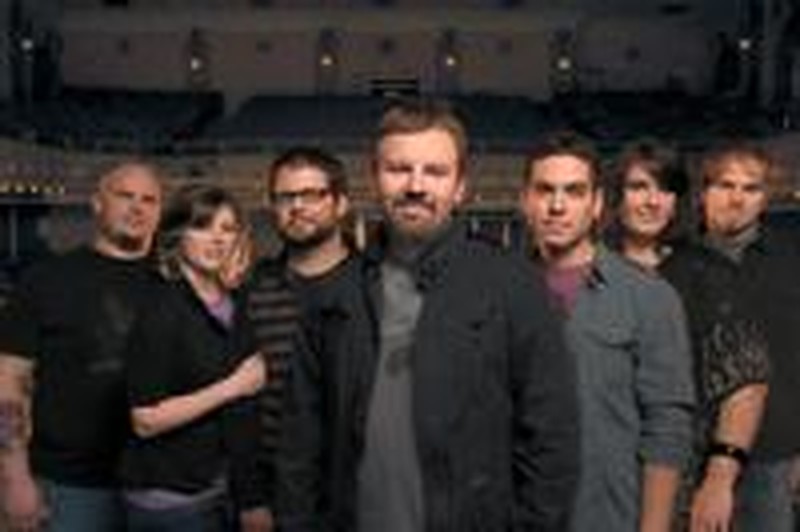Casting Crowns: Casting’s Call
- April Hefner CCM Magazine
- Published Oct 01, 2007

Blessed is the man
Who does not walk in the counsel of the wicked
Or stand in the way of sinners
Or sit in the seat of mockers
But his delight is in the law of the Lord,
And on his law he meditates day and night.
Psalms 1:1-2 (NIV)
While CCM rests its acronym on “Christ. Community. Music.,” it’s a rare day for a story to open with something as blunt and straightforward as Scripture. These stories, after all, are intended to entertain and inspire you, not preach.
But frankly, there’s no better way to introduce the next few pages, no better way to get at the heart and soul of what Casting Crowns is all about. You see, Casting Crowns simply isn’t your typical CCM Magazine cover band. Sure, the group sells millions of CDs in an age when most artists are thrilled to break 100,000. Plus this seven-piece act zooms to the top of Christian radio charts faster than a speeding bullet, causing Nashville label promoters to shake their heads in awe and wonder. And, of course, Casting Crowns tours with everyone from its musical heroes (Steven Curtis Chapman), to top writers and critics’ darlings (Chris Tomlin, Nichole Nordeman), to the hottest new acts to hit the scene (Leeland), all while scoring award nominations in the double digits.
Still, despite the numbers and the accolades, primary writer/front man Mark Hall and the rest of the Casting crew will be the first to laugh at any notions of impending rock stardom. They are, they counter, merely following a clear calling for this season of life, however long it may last.
“You hate saying it, but Casting Crowns isn’t our priority,” says keyboardist/vocalist Megan Garrett. “Our priority is to our churches and to our families. God’s made it so obvious that Casting Crowns is something He’s doing, and we know it’s not going to last forever. It’s just something we’re doing right now, and we’re giving 110 percent to it. We didn’t try to do this. It’s something God has moved into place and made possible.”
And this group believes God has made the band’s success possible for a specific and uncommon purpose. Mark and Megan along with guitarist Juan DeVevo, violinist/vocalist Melodee DeVevo, guitarist Hector Cervantes, bassist Chris Huffman and drummer Andy Williams are convinced the divine lead they are following is merely a musical extension of their day jobs. While other artists concentrate on crafting the newest sounds, perfecting the hippest image or crossing over to impact the mainstream, the men and women of Casting Crowns—all with deep roots in youth ministry—focus on an unlikely goal for Platinum-selling, chart-topping musicians: discipleship.
Walking through the Open Door
From the church, to the church, for the church … those phrases show the origin, direction and mission of Casting Crowns, leading us back to the verses that opened this piece. While the band’s self-titled debut encouraged believers to reach out to those in need with tracks like “If We Are the Body,” and sophomore disc, Lifesong, celebrated what God is doing among his people, Casting Crowns’ newest CD shifts attention to difficult pitfalls in the Christian life, challenging listeners to deeply examine their own relationship with Jesus.
The first verses of Old Testament Psalms form the backdrop for the primary theme behind the band’s newly released album, The Altar and the Door (Beach Street). Hall explains how the picture painted in Psalm 1 portrays the temptations of a slow fade of faithfulness, from walking to standing to sitting. Though the verses describe a man who is blessed, the implied alternative presents “someone who doesn’t walk with God and gets everything he believes from other people. You experience a slow, gradual change because you weren’t delighting in the law of the Lord. You weren’t walking with Jesus; you were walking with people, and people are messed up.”
The ideas behind The Altar and the Door were inspired about 18 months ago when Hall and his co-youth pastor were encouraged by one of their students to check out MySpace. “It wasn’t any major surprise, but we did see a lot of kids who had two worlds going on. MySpace can be Spring Break for the brain, this place you can go and not think anyone’s ever going to find out. Kids would be listed as Christians and then show their porn star name or what kind of kisser they are. They were just presenting so many contradictions on one page. The temptation was to just get upset and think that’s terrible. But MySpace isn’t really a big problem—it’s just revealing what the problem is.”
Hall is quick to assert it’s not a problem unique to teenagers.
“I could talk down to the students and tell them they’re terrible for doing these things, or I can realize that this is in all of us. We don’t want to be bad. We want to love God. We come to church—we’re believers—and we want to serve, but we get out there in the world, and it’s just different. We want to be accepted; we want friends. The compromises start coming in small little increments until you’re just kind of out there. Church becomes more of a guilt activator than a place to go to be with the Lord. It’s a nasty place to live, and we all live there.
“When we’re at the altar, everything’s clear, and it all makes perfect sense, and we know how to live.
We know what’s right and what’s wrong. The struggle is getting this life at the altar out the door. … That’s the problem; we’re finding ourselves somewhere in the middle.”
It’s a concept delivered time and again through the band’s new songs and even in the graphics gracing the album cover for The Altar and the Door. The view from a church pulpit, down that imposing center aisle, past the wooden pews, through the open double doors, into a brightly lit world … as Castings’ Juan DeVevo notes, “It’s a short walk to the front door, but it can be the longest walk of your life.”
Walking in Wisdom
The compromises that take place after walking out the church door Sunday mornings are often triggered by misunderstanding—or taking for granted—the basics of faith, according to Hall. In fact, he asserts that knowing God personally is at the center of many faith crises because believers have a tendency to attempt to use human reason to comprehend the supernatural.
“We’ve all got our own picture of the little red phone in the back of the house where we can call God up,” says Hall. “Some of us see him as Santa Claus or that doting grandfather that you can’t ever quite please or as the big, bad wolf who’s going to zap us any time we do something wrong. Some of us see him as a loan shark—he’ll bless you, but he’s going to call on you later. We all insert our personalities on God, but us trying to figure God out is crazy.”
Hall then relates a story he often shares with his students. Imagine, he says, you bring a new goldfish home to join the one already in the bowl. The older pet does his best to tell the new arrival about their owner. The veteran fish explains how the owner comes in and out of the room through the swinging rectangle, how he watches the box with flashing lights for hours on end and talks on the ringing machine.
“The fish says, ‘And that’s all you need to know about this guy.’ That’s us trying to talk about God. So many times we attach our logic to theology. We create it around how we live or how we want to live. We make God more relevant to our lifestyle than to his Word.”
Garrett agrees, noting that God is God and we are not. “Our culture has a way of saying, ‘Well, God wouldn’t do that.’ I’m not saying that God is some entity in the sky pointing His finger and cursing people, but God never promised us life was going to be easy, all rainbows and puppies. The hard realization is that God is God, and God doesn’t have to answer for anything.”
The only way to know God is to invest time in the Bible and discipleship. What Mark and his fellow youth ministers see, however, is a Christian culture comfortable with following people, rather than the Creator.
Mark explains, “The crux of the whole thing to me is an individual friendship with Jesus. Otherwise, you just have audiences sitting in chairs enjoying Mark’s walk with God. You can’t ask Mark into your heart; you can’t ask Megan into your heart. Kutless can’t go home with you and sing to you in the morning. You’ve got to have something on your own.
“The biggest thing I want our fans to be drawn to are the Scriptures and statements listed below the songs in the liner notes. A song can change your afternoon, but the Word can change your life… Preachers are great; music’s great; books are great; but it needs to be you and God. You’ve got to delight in the law of the Lord. You’ve got to meditate not on Casting Crowns but on what God says to you.”
Walking Out Forgiveness
Delighting in the law of the Lord ultimately starts with understanding our need, with glimpsing the essence of grace. Casting Crowns’ new radio single, “East to West,” focuses on a concept central to salvation, what many call the most basic building block of faith: forgiveness.
I know you’ve cast my sin as far as the East is from the West / And I stand before You now as though I’ve never sinned /But today I feel like I’m just one mistake away / From You leaving me this way
“A lot of us have been sold this idea that you need to be a Christian to be happy, that Christianity will improve your life,” says Hall. “Instead, the reality is that we’re lost. We need Jesus because we’re lost without Him. I’ve earned the deepest pit with the hottest fire and the heaviest chains. I see forgiveness as God giving away His right to revenge in my life. He loved me so much that He’s choosing to remember that against me no more, all because of Jesus.
“We feel we’re supposed to be past forgiveness now. We want to talk about millennial views and predestination and deep stuff. We feel we’re supposed to know about forgiveness already. We act like everything’s fine, but this is one you can’t skip, you can’t move past.”
Garrett agrees: “It’s hard for me to wrap my brain around forgiveness. We’re not really good at forgiving. We say we’ve forgiven someone, but then every time you see that person, it still really, really bothers you. It makes it hard to imagine God not responding the same way to me. Grudges are so big in our minds and our hearts, and it’s amazing to me to think of the ability of God to love us no matter what.”
That unconditional love often has a way of reproducing itself, as evidenced by the familial ties that exist within Casting Crowns. From the band members themselves to spouses and kids to road crew to management, label and business partners, everyone connected to the band plays a vital role in their ministry. This is a dedicated and tightly-knit group, one that elbows and teases one another around the lunch table while sharing any number of inside jokes. More importantly, this is a band that cries together, worships together and lives out life together.
In the past five years, these seven have experienced more together than they could have ever imagined. So what comes next? Don’t ask. Just wait and see.
Hall concludes, “Any time I’ve ever gotten messed up in life is when I’ve decided where I’m going to be in five years. I’m not going there. Will we still be singing? Maybe. I could never have dreamed this up, so I don’t know what comes next. I’m just going to keep following God.”





















